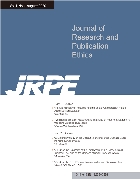- Log In/Sign Up
- E-ISSN2733-7146
- KCI Candidate
 E-ISSN : 2733-7146
E-ISSN : 2733-7146
Vol.3 No.1
Abstract
Purpose: A conflict of interest is defined broadly as a scenario in which one's responsibilities and self-interest collide in a manner that has a significant probability of corrupting one's discernments, motivations, actions, desires, values, and judgments. This study aims to investigate various cases of conflict of interest. Research design, data and methodology: Our study used the preferred reporting items for systematic reviews and meta-analyses (PRISMA) to identify resources. The eligibility of selected prior studies thoroughly was investigated whether they are suitable for the topic of present study. Finally, we collected total 15 previous studies published between 2000 and 2021. Results: Research findings indicate that there are three main cases that might cause a conflict of interest and mandated research ethics education might provide researchers with the tools to identify and battle the temptations and biases provided by conflicts of interest. Researchers could likely be better prepared for conflicts of interest if they investigated the moral difficulties associated with them in advance. Conclusions: Researchers might evade deliberate or unconscious detriment of duties, and also objectivity loss because of the siren song of self-interest by escaping situations whereby they may be tempted to shirk their responsibilities, not to remark the hassles of unveiling conflicts.
Abstract
Purpose: The purpose of this study is to derive clues about the development direction of research ethics and areas of interest which has recently become a social issue in Korea by confirming overseas research trends. Research design, data and methodology: We collected 2,760 articles in scienceON, which including 'research ethics' in their paper. For analysis, frequency analysis, word clouding, keyword association analysis, and LDA topic modeling were used. Results: It was confirmed that many of the papers were published in medical, bio, pharmaceutical, and nursing journals and its interest has been continuously increasing. From word frequency analysis, many words of medical fields such as health, clinical, and patient was confirmed. From topic modeling, 7 topics were extracted such as ethical policy development and human clinical ethics. Conclusions: We founded that overseas research trends on research ethics are related to basic aspects than Korea. This means that a fundamental approach to ethics and the application of strict standards can become the basis for cultivating an overall ethical awareness. Therefore, academic discussions on the application of strict standards for publishing ethics and conducting researches in various fields where community awareness and social consensus are necessary for overall ethical awareness.
Abstract
Purpose: The purpose of this study was to remind the importance of research ethics in research and publication, and to suggest the direction of research ethics by taking examples of research ethics recently implemented by KJFHC. Research design, data and methodology: With reference to the research of existing researchers, why research ethics is important, what are the violations of research ethics, and the efforts of the editorial committee of KJFHC to strengthen research ethics are presented as an example. Results: It is a reality that the concept of research ethics is becoming more complex and important with the introduction of various new academic fields. At this point in time, researchers need to pay more attention to the easily overlooked concept of research ethics. In research ethics, the most important thing is not punishment through monitoring and supervision, but prevention activities of research ethics that can prevent research misconduct before it occurs. As a preventive activity for research ethics, it can be said that the most important is the establishment of a systematic education system and active educational activities of universities and related institutions. Conclusions: This study avoids the general status and solutions for research ethics, and explains the case of the actual academic journal KJFHC and suggests alternatives.
Abstract
Purpose: Research ethics has social implications beyond the issues of personal morality and research integrity. In recent years, research ethics has become a more controversial topic in society. In this study, the concept of the university research ethics curriculum is defined, the current status of the research ethics curriculum is analyzed, and the direction of the university research ethics curriculum development direction is discussed. Research design, data and methodology: The concept of university research ethics education and the current status of research ethics education were examined, and the development direction of the university research ethics curriculum was explored based on the framework <the educational goals - curriculum design and operation method - curriculum operation support system>. Results: field education to secure university research ethics is still insufficient. In other words, only 12 universities for undergraduate programs and 37 universities for graduate programs included research ethics in their regular curriculum. Conclusions: The occurrence of research misconduct is mainly caused by not recognizing the error or not taking it seriously. In particular, university research misconduct results from a lack of understanding of research ethics, poor research education, a performance-oriented academic climate, and the absence of an institutional system for establishing research ethics.













